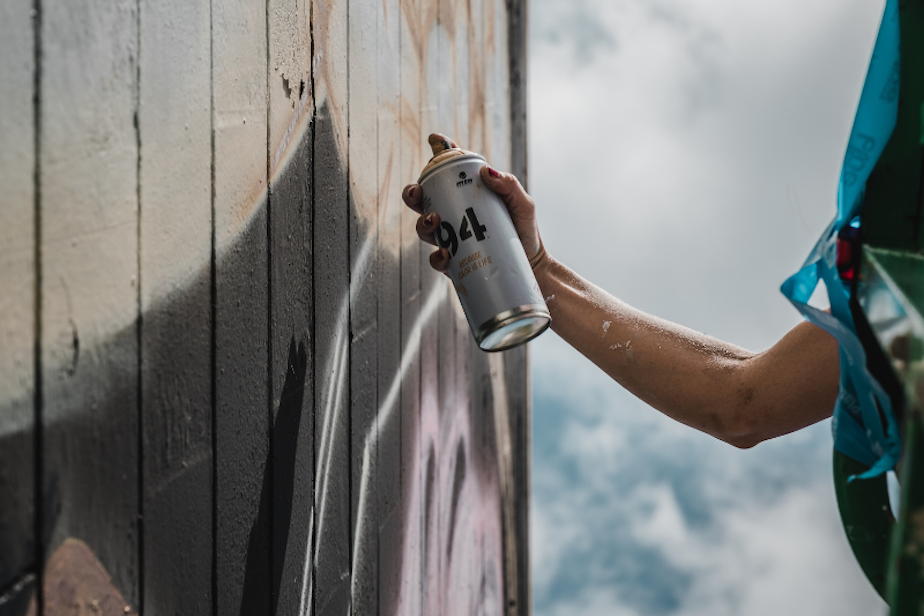Lawsuit challenges Seattle's graffiti ordinance

Four people have filed a complaint against the city of Seattle after being arrested and jailed in 2021 for writing easy-to-clean political messages on temporary barricades outside of the Seattle Police East Precinct.
They allege the city's anti-graffiti ordinance is an unconstitutional violation of free speech.
In a statement, the city attorney’s office said, “The City Attorney’s Office is reviewing the complaint and will defend against this action. The property destruction ordinance challenged as part of this suit is an essential tool for addressing vandalism of public and private property.”
None of the attorneys on the case would speak to KUOW, but independent attorney Philip Chinn says the city’s code essentially allows anyone who writes anything on a surface they do not own to be arrested.
“I think the bigger issue is that the law is written to not care whether it's washable chalk or charcoal that was going to wash off,” Chinn said.
The complaint alleges that the law as written would allow police to arrest people for everyday occurrences, such as using sidewalk chalk on the sidewalk outside of your home, that aren’t actually related to graffiti.
Chinn says the law would technically allow for him to be arrested, “If I was in court and wrote something on the notepad of the lawyer sitting next to me. That would be covered under this statute.”
Sponsored
According to the complaint, filed in U.S. District Court in Seattle, SPD has only enforced the anti-graffiti ordinance when statements written are anti-police.
“Based on everything I'm seeing, it's kind of unbelievable,” Chinn said. “The different ways that it seems like they were targeting people based on the content of their political speech. Especially in contrast to statements from the Seattle Police themselves saying that similar stuff wouldn't fall under this law and the other examples of pro-police chalking being apparently perfectly OK with them.”
The complaint includes photos posted to the official social media accounts of the Seattle Police Department, where uniformed officers are at community events and posing in pictures in front of pro-police statements written in sidewalk chalk.
The arrests began after one of the four plaintiffs wrote, “peaceful protest” in ordinary charcoal on an eco-block, a large slab of recycled concrete used for temporary barricades, that was being used as a barrier outside the East Precinct.
Another allegation in this complaint is that at the time the four people were arrested for writing statements ranging from “free protest” to “F*** the Police”, SPD was under an order to not arrest people for nonviolent crimes due to the Covid-19 pandemic.
Sponsored
But the central claim being made in the lawsuit is that Seattle’s graffiti ordinance, as written in Seattle’s municipal code, is unconstitutional.
Criminal defense attorney Sade Smith explained why this ordinance could be seen as a violation of constitutional rights. She said a similar state law includes guidelines to ensure people are not arrested unnecessarily.
“The plaintiff's attorneys pointed out that the Washington state code, or the RCW Revised Code of Washington, has a similar statute,” Smith said. “But their (state of WA) statute accounts for when property destruction is permissible like if you have permission from the owner, or if it's your property or something like that.”
Smith said the Seattle Municipal Code is written so that, “If you destroy property or write on something, it’s property destruction, and we decide at trial. So, even people who are engaged in lawful conduct are grouped in and their First Amendment rights are impacted, shuttered, and destroyed. Because the law is too over-broad, which is another one of the claims.”
As for violating constitutional rights, Smith said the complaint alleges viewpoint discrimination by SPD only selecting to enforce this ordinance when views are expressed that do not align with their own. This is prohibited under the Constitution in the First Amendment.
Sponsored
In reading the complaint, what bothered Smith significantly was the leeway given to SPD to arrest and jail people unnecessarily, which ultimately forces people to engage with the criminal justice system.
“Even if your neighbor came out and said, ‘Hey, I give you my permission to do this,’ They could still arrest you, charge you, and you would have to go through the whole criminal legal process and then when you finally get towards the end and you go to trial, then you would bring that friend as a defense and hopefully your neighbor is still available to testify,” Smith said.
While addressing property destruction is a concern to the city of Seattle and its citizens, the complaint points to people being arrested and jailed for essentially causing damage that has no financial cost to the victim.
When asked for comment, the city attorney’s office referenced a recent incident when graffiti artists were arrested after causing over $300,000 in damage. When asked how a case with no property damage relates to a case with hundreds of thousands of dollars in damage, or how cases with minimal or no property damage would be handled moving forward, the city attorney’s office declined to comment further.
In a previous interview, Mayor Bruce Harrell said his approach to graffiti in the city would avoid arresting and jailing people for nonviolent offenses that did minimal damage.




